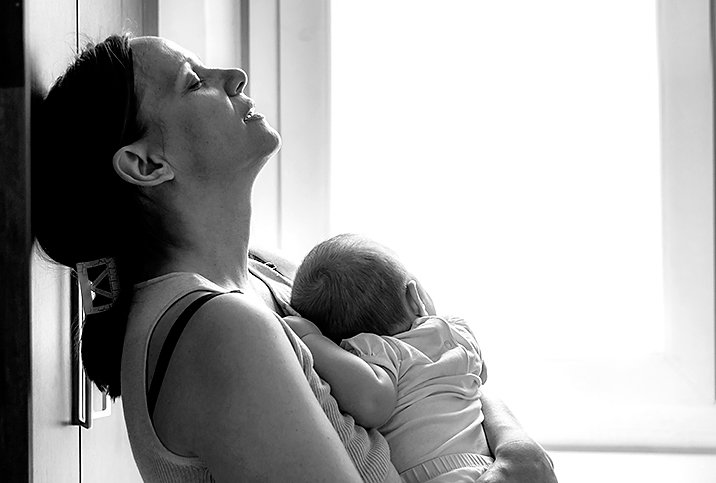Postpartum Depression Affects Your Physical Health, Too

When we think of postpartum depression, it's natural to focus on the mental health implications: the feelings of sadness, irrational anger or irritation, increased anxiety, hopelessness, guilt and mood changes. But postpartum depression (PPD) can impact physical health, as well, and it's important to understand what you or others around you may be experiencing.
Postpartum depression affects up to 600,000 women every year in the United States. The symptoms vary from woman to woman and the longevity of them depends on individual circumstances.
Understandably, there is a focus on the mental aspects of postpartum depression, as these symptoms are often debilitating and can negatively impact relationships. However, many women are unprepared for the physical changes that can occur with postpartum depression, too. Mental and physical health are closely linked, so when you experience changes in your mental health, you can expect to see physical changes, as well.
What to expect
It's unclear whether the mental changes associated with postpartum depression affect physical health or it's the other way around, but what we do know is these symptoms are often experienced together. For some women who develop PPD, the physical symptoms can have a severe impact on their health and quality of life.
These symptoms can include weight loss or weight gain, because mood changes can be a trigger for overeating or a lack of appetite, said Lesley Gilchrist, M.Sc, a registered midwife and co-founder of My Expert Midwife in Knaresborough, England.
"The psychological symptoms can also cause physical symptoms, such as tiredness and fatigue or being hypervigilant," Gilchrist said. "This can lead to aches and pains and the development of illnesses, such as stress-related skin conditions."
Some people may also experience low energy, insomnia, oversleeping and trouble focusing, added Sarah Yamaguchi, M.D., a Los Angeles-based gynecologist at DTLA Gynecology. These symptoms can affect your day-to-day life and restrict your ability to care for yourself while caring for a new baby.
Low milk production is another issue that many new mothers face. For women with postpartum depression who are experiencing extreme sadness and hopelessness, breastfeeding can be another overwhelming obstacle. There's evidence to suggest that the issues of milk production and depression can overlap. Medication for PPD along with lack of rest can also hinder milk supply, which can make it very difficult to breastfeed. This distressing experience can cause the mother to have difficulties bonding with the baby, which can increase feelings of guilt and hopelessness, commonly associated with postpartum depression.
Feeling fatigued and generally unwell may lead to poor diet and lack of exercise, as well, which can lead to other health complications, such as diabetes and high blood pressure. As many new mothers spend more time indoors due to increased anxiety and fear, they miss out on the benefits of fresh air, exercise and socializing. This can increase anxiety and depression in some women and cause them to become more withdrawn over time.
Are there risk factors?
Anyone can be affected by postpartum depression, even if they have no prior mental health issues or a history of PPD with a previous pregnancy.
However, Gilchrist explained the following factors can increase your chances of developing postpartum depression:
- A lack of support from close friends and relatives, leading to isolation and loneliness
- A history of a mental health problem or personality disorders, including anxiety and depression
- An abusive childhood or relationship
- Childhood neglect
- A lack of access to mental health specialists or related services in the past
- Previous post-traumatic stress disorder.
If you are worried you are at risk of PPD with your current or future pregnancy, you should discuss this with your doctor. They may recommend therapy to work through some of your emotions and dig deeper into your concerns.
If you have preexisting mental health conditions, your doctor can discuss the use of medications that are safe to use throughout pregnancy, which can aid in stabilizing your moods and lowering stress levels.
How long does postpartum depression last?
There is no timeframe for how long these physical symptoms can last, but according to Gilchrist, they can last anywhere from a few months to several years if left untreated.
Even as hormones stabilize, some women may still suffer from depression, and this can be affected by many factors, such as diet, lifestyle, lack of sleep, trauma and other stressors.
This is why it's important to spot the signs of PPD early to avoid delaying treatment.
What treatment options are available?
Treatment options are dependent on the severity of symptoms, whether the mother is breastfeeding and if any other mental health conditions are present. Cognitive behavioral therapy (CBT) and medication are the two most common methods for treating postpartum depression, Yamaguchi said.
Antidepressants may be prescribed to help reduce mood swings and allow many women to function more freely. If symptoms are severe or there is a danger to the mother, antipsychotic drugs may be prescribed instead.
Other than medication and therapy, general lifestyle changes, such as getting sufficient rest, eating a more balanced diet, going for gentle walks and staying hydrated, can contribute to better physical health. Making these lifestyle changes can be difficult when you're struggling with your mental health, so don't beat yourself up if you're having a hard time. Instead, seek help.
During this time, it's important for anyone suffering from postpartum depression to reach out to close friends and relatives for additional support and speak out if they are struggling.

















